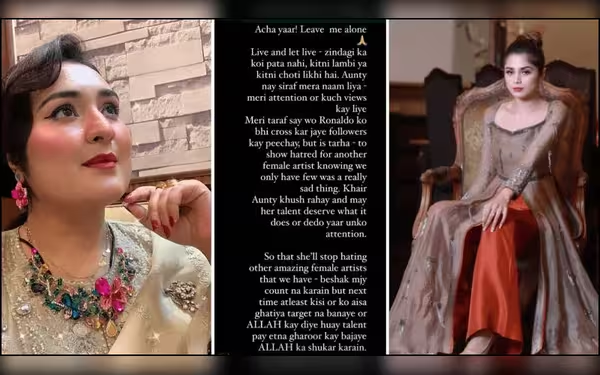Saturday, November 16, 2024 07:31 PM
Sara Raza Khan And Aima Baig: The Misuse Of 'Auntie' And 'Nani' In Pakistan
- Celebrity feud highlights casual sexism in society
- Age-related insults undermine women's credibility
- Internalized misogyny pits women against each other
 Image Credits: thefridaytimes
Image Credits: thefridaytimesThe exchange between Sara Raza Khan and Aima Baig reveals the troubling use of 'auntie' and 'nani' as insults in Pakistani society.
In recent days, a social media spat between two prominent Pakistani singers, Sara Raza Khan and Aima Baig, has sparked a broader conversation about the implications of using terms like "auntie" and "nani" as insults. The incident began when Sara Raza Khan criticized Aima Baig, labeling her an "auto-tune" artist, suggesting that Baig's singing abilities were heavily reliant on technology. In response, Aima Baig shared an unedited video of her singing and referred to Sara as an "attention-seeking auntie," igniting a debate that extends beyond mere celebrity rivalry.
While many might dismiss this as just another celebrity feud, the choice of words used in this exchange reveals a troubling trend in Pakistani society. The term "auntie" is often employed to undermine a woman's credibility based on her age or appearance, perpetuating a form of casual sexism. This is not just about two singers; it reflects a societal attitude that devalues women's opinions simply because they fit certain stereotypes, such as being a mother or dressing in traditional attire.
Interestingly, the ages of the two singers reveal a contradiction in the use of these terms. Sara Raza Khan is 28, while Aima Baig is 29. This raises the question: why is it acceptable to label a woman as an "auntie" when she is, in fact, younger than her counterpart? This inconsistency highlights the arbitrary nature of such insults, which are often wielded to dismiss women rather than engage with their ideas.
The issue extends beyond the music industry. In politics, we see similar patterns, with male politicians often using terms like "nani" to belittle their female counterparts. For instance, Imran Khan's frequent use of "nani" to refer to Maryam Nawaz Sharif has led many to mistakenly believe she is older than him. This demonstrates how age-related insults are not just personal attacks but are deeply embedded in the fabric of our political discourse.
Moreover, the phenomenon of women attacking other women is not new. During a recent event, comments made about Maryam Nawaz's appearance at her son's wedding revealed a disturbing trend of women shaming each other based on age and attire. This behavior is often justified under the guise of protecting societal values, yet it only serves to perpetuate a cycle of misogyny.
In a patriarchal society, women are often pitted against each other, taught to see one another as rivals rather than allies. This internalized misogyny is further exacerbated by societal norms that dictate how women should behave, dress, and express themselves. When women express solidarity with one another, they are frequently labeled as "liberals" or worse, further isolating them from their peers.
As we reflect on the recent exchange between Sara Raza Khan and Aima Baig, it is crucial to recognize the broader implications of using terms like "auntie" and "nani" as insults. These words are not just harmless jabs; they are part of a larger narrative that seeks to undermine women's voices and contributions. It is time for society to challenge these stereotypes and foster an environment where women can support one another, regardless of age or appearance. Only then can we hope to break free from the shackles of misogyny and build a more inclusive future.













